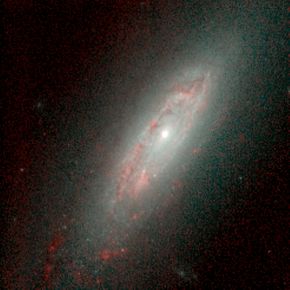NGC 3593
| NGC 3593 | |
|---|---|
 An infrared Hubble Space Telescope (HST) image of NGC 3593. | |
| Observation data (J2000 epoch) | |
| Constellation | Leo |
| Right ascension | 11h 14m 37.002s[1] |
| Declination | +12° 49′ 04.87″[1] |
| Redshift | 627[2] km/s |
| Distance | 20.5 Mly (6.28 Mpc)[2] |
| Apparent magnitude (V) | 12.6[3] |
| Characteristics | |
| Type | SA(s)0/a[3] |
| Apparent size (V) | 1′.5 × 1′.1[3] |
| Other designations | |
| UGC 6272,[3] PGC 34257[3] | |
NGC 3593 is a lenticular galaxy located in the constellation Leo. It has a morphological classification of SA(s)0/a,[3] which indicates it is a lenticular galaxy of the pure spiral type.[4] Despite this, it has a large amount of hydrogen, both in its molecular (H
2) and atomic (H) form.[5] It is a starburst galaxy, which means it is forming new stars at a high rate. This is occurring in a band of gas surrounding the central nucleus. There is a single arm, which spirals outward from this ring.[6] It is frequently but not consistently identified as a member of the Leo Triplet group.[7]
This galaxy is known to contain two counter-rotating populations of stars—that is, one set of stars is rotating in the opposite direction with respect to the other.[5] One means for this to occur is by acquiring gas from an external source, which then undergoes star formation. An alternative is by a merger with a second galaxy. Neither scenario has been ruled out. The age of the lower mass, counter-rotating population is younger by about 1.6 ± 0.8 Gyr than the primary star population of the galaxy.[6]
A dynamical study found that there is likely a supermassive black hole (SMBH) at the center of NGC 3593. The mass of the SMBH is between 3.0×105 and 4.3×106 solar masses.[5]
References
[edit]- ^ a b Skrutskie, Michael F.; Cutri, Roc M.; Stiening, Rae; Weinberg, Martin D.; Schneider, Stephen E.; Carpenter, John M.; Beichman, Charles A.; Capps, Richard W.; Chester, Thomas; Elias, Jonathan H.; Huchra, John P.; Liebert, James W.; Lonsdale, Carol J.; Monet, David G.; Price, Stephan; Seitzer, Patrick; Jarrett, Thomas H.; Kirkpatrick, J. Davy; Gizis, John E.; Howard, Elizabeth V.; Evans, Tracey E.; Fowler, John W.; Fullmer, Linda; Hurt, Robert L.; Light, Robert M.; Kopan, Eugene L.; Marsh, Kenneth A.; McCallon, Howard L.; Tam, Robert; Van Dyk, Schuyler D.; Wheelock, Sherry L. (1 February 2006). "The Two Micron All Sky Survey (2MASS)". The Astronomical Journal. 131 (2): 1163–1183. Bibcode:2006AJ....131.1163S. doi:10.1086/498708. ISSN 0004-6256. S2CID 18913331.
- ^ a b Crook, Aidan C.; et al. (February 2007), "Groups of Galaxies in the Two Micron All Sky Redshift Survey", The Astrophysical Journal, 655 (2): 790–813, arXiv:astro-ph/0610732, Bibcode:2007ApJ...655..790C, doi:10.1086/510201, S2CID 11672751.
- ^ a b c d e f "NASA/IPAC Extragalactic Database". Results for NGC 3593. Retrieved 2007-04-15.
- ^ Buta, Ronald J.; et al. (2007), Atlas of Galaxies, Cambridge University Press, pp. 13–17, ISBN 978-0521820486.
- ^ a b c Nguyen, Dieu D.; Bureau, Martin; Thater, Sabine; Nyland, Kristina; Den Brok, Mark; Cappellari, Michele; Davis, Timothy A.; Greene, Jenny E.; Neumayer, Nadine; Imanishi, Masatoshi; Izumi, Takuma; Kawamuro, Taiki; Baba, Shunsuke; Nguyen, Phuong M.; Iguchi, Satoru; Tsukui, Takafumi; Lam, T. N.; Ho, Than (2022). "The MBHBM⋆ Project – II. Molecular gas kinematics in the lenticular galaxy NGC 3593 reveal a supermassive black hole". Monthly Notices of the Royal Astronomical Society. 509 (2): 2920–2939. arXiv:2110.08476. doi:10.1093/mnras/stab3016.
{{cite journal}}:|last2=has generic name (help) - ^ a b Coccato, L.; et al. (January 2013), "Spectroscopic evidence of distinct stellar populations in the counter-rotating stellar disks of NGC 3593 and NGC 4550", Astronomy & Astrophysics, 549: A3, arXiv:1210.7807, Bibcode:2013A&A...549A...3C, doi:10.1051/0004-6361/201220460, S2CID 55949435.
- ^ McArthur, Hartmut Frommert, Christine Kronberg, Guy. "The Leo Triplett (M66 group)". www.messier.seds.org. Retrieved 2017-12-22.
{{cite web}}: CS1 maint: multiple names: authors list (link)
External links
[edit]
